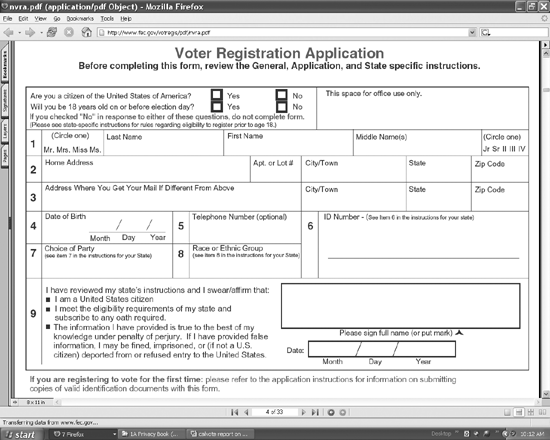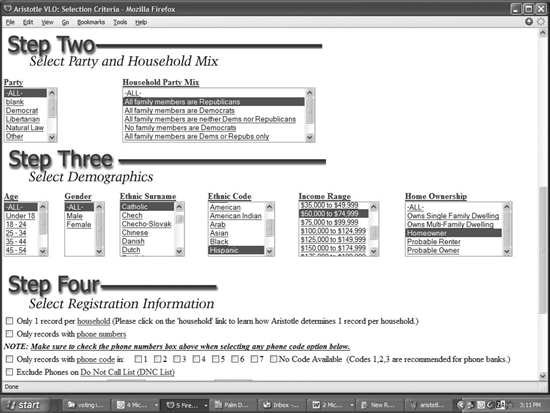POLITICAL PRIVACY
| < Day Day Up > |
Vote Yes on PrivacyThe Annoyance:I just moved across country, and one of the first things I did was register to vote in my new state. A few weeks later I started receiving phone calls, junk mail, and visits from local party officials. Did somebody take a peek at my voter registration records? The Fix:They did a lot more than peek. Your voter registration information is part of the public record, though what's in it and who can access it depends on the state where you live. At a minimum, voter rolls contain your name, address, date of birth, and the elections you've voted in (though not whom you voted for). But many states also collect additional information, such as your party affiliation, gender, race, and all or part of your Social Security Number (see Table 6-2). By Federal law, all 50 states and the District of Columbia must share your voter registration records with political candidates and their parties. The parties then plug this information into massive databases, combine it with other data, and use it to raise money, get out votes, and otherwise harangue you at election time. Politicos aren't the only ones who have access to your voter data. According to a May 2004 study by the California Voter Foundation (http://www.calvoter.org/), 43 states use voter registration lists to find prospective jurors. (In Arkansas, Missouri, and Montana, voter rolls are the only source for filling the jury box). Some 22 states allow your registration records to be used for commercial purposes, such as soliciting contributions to the Sierra Club or the National Rifle Association. Most states will withhold or black out the more sensitive information (like your date of birth or SSN) before sharing your records, but not all of them do.
Worse, the study found that 38 state voter registration forms ask for information that isn't required by state law, and only 13 forms contain notices that this information is optional. For example, although 46 states ask for a phone number, only 18 legally require it. Some 30 states ask for your Social Security Number, but only 8 states demand the whole number and only 5 require the last four digits. (Eventually, however, all states will require part of your SSN or your driver's license number, in order to comply with the Help America Vote Act of 2002.) So when you register to vote, your first line of defense is to only hand over information that's legally required. A good option is to use the "Motor Voter" form created under the National Voter Registration Act of 1993. This form limits the amount of information states can collect, leaving out fields like place of birth or school district that standard state forms may include (see Figure 6-3). Only three states (New Hampshire, Wisconsin, and Wyoming) won't accept the NVRA form in place of their own. You can download the form, along with 30-plus pages of notes detailing the requirements for each state, at http://www.fec.gov/votregis/pdf/nvra.pdf. annoyances 6-3. Drive-by voting...
Voters for SaleThe Annoyance:I want to participate in the electoral process, but I don't want to give up my personal information to perfect strangers for the privilege. Just who can look up my voter registration record? The Fix:Any citizen can visit your local board of elections and look up your paper record. And as of November 2002, 11 states let you look up anyone's voter registration info online for free, according to the California Voter Foundation study. While this makes it a snap to confirm you are indeed registered and find the correct polling place, it could also make it easier for strangers to look you up. Most states require you to enter a PIN, part of your Social Security Number, or your date of birth before you can look at the records; others require only a name or street address. Seven states display only the polling place of the voter you look up, but four (both Carolinas, Delaware, and Georgia) display the voter's street address and sometimes a lot more. In North Carolina, for example, you can look up anyone's record by their name and view their gender, race, party affiliation, and whether they've voted recently. If you have their date of birth, you can also obtain their street address. The only way to remove your name from the state's online rolls is if you've got a court order stating you're the victim of domestic abuse or stalking, according to Don Wright, general counsel for the North Carolina State Board of Elections. If you're willing to fork over some dough, you can get a lot more voter information. Sign up with Aristotle International's Voter Lists Online (http://www.voterlistsonline.com), and you can buy highly-specific lists of registered voters at $25 per 1000 names from nearly any state in the union. For example, you can buy the names and addresses of all 1.5 million registered Republicans in the state of North Carolina for about $38,000. When I narrowed that list to white homeowners who make more than $50,000 a year and voted at least once in the last four years, Aristotle located 16,485 records (cost: $412.13). Among other things, Aristotle can cull information by state, county, or precinct; party affiliation; yearly income; race and religion; voting frequency; parental status; and political donations (see Figure 6-4). annoyances 6-4. Aristotle's Voter Lists Online is your gateway to unearthing all sorts of data about voters based on location, party, income, race, religion, and more. State laws vary widely on who can access this data and what they can use it for, but Aristotle doesn't make a huge effort to verify your claims. When I signed up, I got an email from an Aristotle representative asking how I was planning to use the information. The answer "research for a book" was good enough. Three states (Florida, Kentucky, and Virginia) don't provide information via Aristotle's site but let you order it by phone. Only Arizona forbids the sale of voter registration information online. (When contacted, Aristotle declined to comment.) Although Aristotle is the best known service, it's just one of several that mine voter registration information and sell it to virtually anyone, says Kim Alexander, president and founder of the California Voter Foundation. "It's quite a cottage industry with very little oversight," she says. "There are laws on the books preventing re-use of voter data, but they're not being very carefully enforced." Retail PoliticsThe Annoyance:Can people see how much I've donated to a political cause or candidate? The Fix:Depends on how much you gave. If you contribute $200 or more to a single candidate, party, or political organization in any election cycle, the lucky recipient must give the Federal Election Commission your name, employer, the state you live in, the amount you gave, and who you gave it to. (Some organizations report all contributions, regardless of their amount.) Then the FEC (http://www.fecinfo.com) and sites like opensecrets.org, PoliticalMoneyLine.com, and CampaignMoney.com make that information available online to anyone who wants it. For example, a quick search of the top individual donors on opensecrets.org reveals that Joseph and Sue Ellen Canizaro of New Orleans gave nearly $270,000 to Republican candidates in the 2004 election cycle, while the Democrats received around $258,000 from Jeffrey and Francesca Cooper of Edwardsville, Illinois. But that's pocket change compared to total contributions to political organizations (known as "527" groups, because their activities are governed under Section 527 of the Internal Revenue Code) made by liberal George Soros ($24 million) or conservative Bob Perry ($4.5 million). Wondering about your neighbors' or coworkers' political persuasions? You can get a list of donors by ZIP code, employer, occupation, and much more. This isn't necessarily a bad thing it's beneficial to society to know who's buying our politicians, and for how much. But right now there's a small loophole you can use to protect a dollop of your privacy. Although the FEC keeps a cumulative record of all your contributions, it doesn't provide electronic records for donations under $200 per candidate or group, says Larry Noble, executive director for the Center for Responsive Politics, which runs opensecrets.org. (Although he adds that the FEC could change its policy at any time.) If you want to keep your political leanings more private, you could spread your bets by making a series of small donations over time or donate small amounts to a range of like-minded organizations. Instead of writing a check for $2000, write 10 checks to various orgs for $199 each; though some of these donations may show up online, it's less likely. You could also funnel money to a nonpartisan group that's not required to report to the FEC such as the United States Chamber of Commerce that devotes considerable resources to political causes. And, of course, you can volunteer your time in unlimited quantities, a form of contribution that isn't recorded by the FEC. (For a citizen's guide to FEC rules, see http://www.fec.gov/pdf/citizen_guide_pub.pdf).
| ||||||||||||||||||||||||||||||||||||||||||||||||||||||||
| < Day Day Up > |
